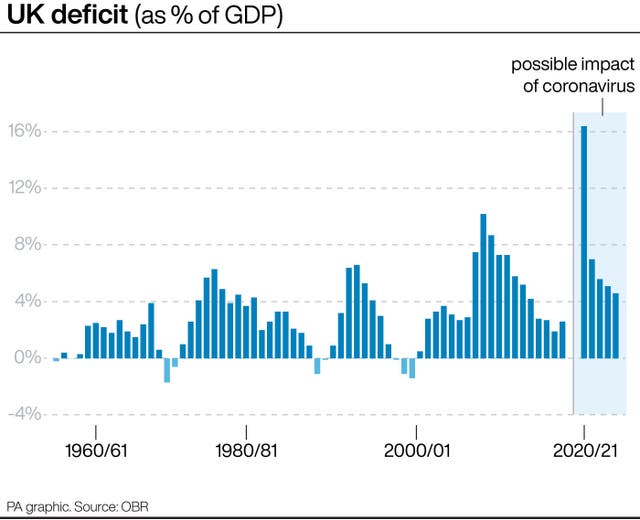Chancellor to extend furlough scheme until end of September as he unveils Budget
Further support for self-employed workers will also be announced, helping many people who became self-employed in 2019/20.

Rishi Sunak will extend the furlough scheme until the end of September and pledge to do “whatever it takes” to help people and businesses through the coronavirus crisis when he unveils his Budget.
The Chancellor is set to outline a three-point plan to support people through the coming months, rebuild the economy and fix the ravaged public finances in the wake of the pandemic.
In his statement to the Commons on Wednesday, he will build on the £280 billion package of support already given by the Treasury during the crisis, with plans to extend the furlough scheme until the end of September.
The Coronavirus Job Retention Scheme has protected more than 11 million jobs since its inception, but under plans to taper the Government’s contribution, employers will be expected to pay 10% towards the hours their staff do not work in July.
Further support for self-employed workers will also be announced, with more than 600,000 people – many of whom became self-employed in 2019/20 – now eligible for cash grants.
A fourth grant from the Self-Employment Income Support Scheme (SEISS) will be available to claim from April, worth 80% of three months’ average trading profits up to £7,500, while the Chancellor will set out details of a fifth grant.
The Treasury said that hundreds of thousands more people will be eligible for the grants this time, as tax return data for 2019/20 is now available. Mr Sunak faced criticism that newly self-employed people were unable to benefit from the scheme previously.
Ahead of the Budget, he said: “Our Covid support schemes have been a lifeline to millions, protecting jobs and incomes across the UK.
“There’s now light at the end of the tunnel with a roadmap for reopening, so it’s only right that we continue to help business and individuals through the challenging months ahead – and beyond.”
The Chancellor will pledge to use the Government’s full “fiscal firepower” to protect jobs and livelihoods, vowing to do “whatever it takes” to help businesses and people.
He is expected to tell MPs: “First, we will continue doing whatever it takes to support the British people and businesses through this moment of crisis.
“And, third, in today’s Budget we begin the work of building our future economy.”
The extension to the furlough scheme was welcomed by business organisations, with the CBI’s chief economist Rain Newton-Smith saying it will keep “millions more in work and give businesses the chance to catch their breath as we carefully exit lockdown”.
Economic think tank the Resolution Foundation’s chief executive Torsten Bell said the phased tapering off will avoid a “risky cliff-edge”, but warned that the “peak of unemployment is ahead rather than behind us”.
However Bridget Phillipson, shadow chief secretary to the Treasury, said the changes to support schemes “could have been made months ago” – accusing Mr Sunak of focusing on “getting his moment in the sun rather than protecting jobs and livelihoods”.
And Len McCluskey, general secretary of Unite, said that while the extra months of furlough support offer “some stability in the rocky months ahead”, the scheme should be extended until 2022.
The Office for Budget Responsibility (OBR) will publish its latest forecasts alongside the Budget – with Boris Johnson expecting a recovery to be “much stronger than many of the pessimists have been saying over the last six months or so”.
In its November forecasts, the OBR indicated the national debt could reach 105% of gross domestic product – a measure of the size of the economy – in 2020/21, with a record peacetime borrowing of £394 billion.

– £5 billion for a new grant scheme to help businesses.
– £1.65 billion to boost the UK’s vaccine roll-out.
– £520 million to support small UK businesses with training and software.
– Nearly £410 million to support the badly-hit culture sector.
– £300 million to help cricket, tennis and horse racing in a summer sports recovery package.
– £150 million to help local communities save struggling pubs, sports clubs, theatres and Post Offices.
– £2.8 million to help fund a joint UK and Ireland bid to host the 2030 football World Cup.
The Chancellor is reportedly planning to extend the stamp duty holiday until the end of June, while The Times also said the business rates holiday for the retail, hospitality and leisure sectors will also be continued along with the VAT cut for hospitality and tourism.
A freeze on fuel duty looks set to continue, but Mr Sunak is said to be considering raising corporation tax to as much as 25% from 19%.
The Sunday Times said he could freeze the level at which people start paying the basic rate of income tax – £12,500 – and the £50,000 threshold at which they begin paying the higher 40p rate for at least three years.
An extension to the £20-per-week uplift to Universal Credit for six months has also been mooted, as have plans to freeze the lifetime allowance – the amount people can save in their pension pot before tax charges kick in – at just over £1 million.
The Tory manifesto in 2019 promised not to raise the rates of income tax, National Insurance or VAT, and Mr Sunak has also been warned against raising taxes now by several Conservative MPs.
Mr Sunak spoke to the Queen on Tuesday evening ahead of his Budget, as per tradition.





